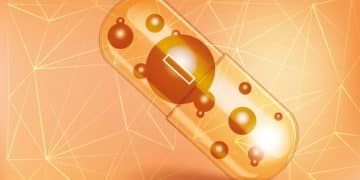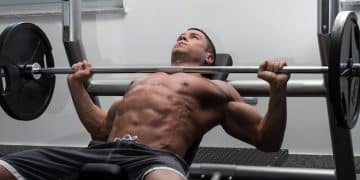Zinc for Bodybuilders: Testosterone & Immunity Boost

Zinc supplements offer bodybuilders a dual advantage, crucially supporting both natural testosterone production and robust immune function, which are vital for muscle growth and recovery, as well as maintaining overall health during intense training cycles.
For bodybuilders and athletes, maximizing performance and recovery is a constant pursuit. Among the myriad of supplements available, zinc supplements: boost testosterone levels and support immune function for bodybuilders stands out for its fundamental role in numerous physiological processes crucial to athletic development. Understanding how zinc impacts testosterone production, immune health, and overall performance is essential for anyone serious about optimizing their gains.
The Crucial Role of Zinc in Testosterone Synthesis
Zinc, an essential trace mineral, plays a profoundly intricate role in male physiological health, particularly concerning testosterone. For bodybuilders, where optimal hormonal balance is paramount for muscle anabolism and strength, zinc’s contribution to testosterone synthesis is a highlight. The mechanisms are complex yet fascinating, illustrating why this unassuming mineral is often considered a bedrock nutrient for those seeking to maximize their natural hormonal output.
Several enzymatic reactions essential for testosterone production rely on adequate zinc levels. Zinc serves as a cofactor for enzymes like steroidogenic acute regulatory (StAR) protein, which transports cholesterol—the precursor to all steroid hormones, including testosterone—into the mitochondria of Leydig cells in the testes. Without sufficient zinc, this initial, critical step is hampered, directly limiting the raw material available for hormone synthesis. Furthermore, zinc is involved in the conversion of androstenedione to testosterone, underscoring its multifaceted involvement in the steroidogenic pathway.
Beyond its direct enzymatic roles, zinc exerts influence by modulating other hormones and enzymes that interact with testosterone. It helps inhibit the aromatase enzyme, which converts testosterone into estrogen. For bodybuilders, high estrogen levels can lead to undesirable side effects such as gynecomastia and increased fat storage, countering their efforts to build lean muscle. By keeping aromatase activity in check, zinc helps maintain a more favorable testosterone-to-estrogen ratio, preserving more active testosterone in the body.
Another often overlooked aspect is zinc’s effect on sex hormone-binding globulin (SHBG). SHBG is a protein that binds to sex hormones, including testosterone, making them biologically inactive. Higher levels of SHBG mean less free, bioavailable testosterone circulating in the bloodstream. Research suggests that zinc supplementation can help reduce SHBG levels, thereby increasing the amount of free testosterone available to muscle cells and other target tissues. This means that even if total testosterone levels are adequate, zinc can optimize its utility, ensuring more of it is usable for muscle protein synthesis and recovery.
The link between zinc deficiency and reduced testosterone is well-documented, particularly in populations where dietary intake is suboptimal or where mineral absorption is compromised. Studies on zinc-restricted diets have consistently shown a significant drop in serum testosterone levels, which can be reversed upon repletion with zinc. This evidence forms the scientific basis for why bodybuilders, who might have higher zinc requirements due to intense training and potential losses through sweat, should pay close attention to their zinc status. Ensuring adequate zinc intake through diet or supplementation can therefore be a foundational strategy in supporting optimal natural testosterone levels, critical for continued muscle growth, strength gains, and overall athletic vitality.
Zinc’s Impact on Immune System Function for Athletes
In the demanding world of bodybuilding, the immune system is under constant assault. Intense training sessions create temporary immunosuppression, making athletes more susceptible to infections. This vulnerability can lead to missed training days, slow recovery, and ultimately, a halt in progress. Here, zinc emerges as a powerful ally, playing a pivotal role in fortifying athletic immunity and safeguarding health.
Zinc is far from a mere bystander in immune function; it is a central player, indispensable for the proper development and function of immune cells. Without sufficient zinc, the entire immune apparatus can falter.
Key Immune Roles of Zinc:
- T-cell development and function: T-cells are critical for adaptive immunity, responsible for recognizing and fighting off specific pathogens. Zinc is essential for the maturation of T-cells in the thymus and for their subsequent activation to mount an effective immune response.
- B-cell function: B-cells produce antibodies that neutralize foreign invaders. Zinc’s role extends to these cells, ensuring they can effectively churn out the necessary antibodies.
- Natural Killer (NK) cell activity: NK cells are part of the innate immune system, providing a rapid response against virus-infected cells and some tumor cells. Zinc helps maintain the cytotoxic activity of NK cells.
- Antioxidant defense: Zinc is a component of superoxide dismutase (SOD), a powerful antioxidant enzyme. Intense exercise produces free radicals, which can damage cells and suppress immune function. Zinc’s antioxidant properties help mitigate this damage, indirectly supporting immune resilience.
Beyond these direct cellular roles, zinc influences various signaling pathways within immune cells, modulating their response to pathogens. It helps regulate inflammatory processes, ensuring that inflammation, a necessary part of the immune response, does not become chronic or excessive, which can be detrimental to recovery and overall health. For bodybuilders, who frequently experience exercise-induced muscle damage and inflammation, this regulatory role is particularly beneficial.
Moreover, zinc plays a role in maintaining the integrity of mucosal barriers, such as those in the respiratory and gastrointestinal tracts. These barriers are the body’s first line of defense against pathogens. A robust mucosal barrier, supported by adequate zinc, can prevent pathogens from entering the bloodstream and triggering systemic infections. Considering the increased exposure to various environmental stressors during training and travel, maintaining these barriers is a key preventive measure for athletes.
The collective impact of zinc on these diverse immune functions means that a deficiency translates directly to impaired immunity, leaving bodybuilders vulnerable. Adequate zinc supplementation or dietary intake, therefore, acts as a preventative measure, helping to reduce the incidence and severity of infections, ensuring athletes can consistently train, recover, and make progress without interruption.
Optimal Zinc Supplementation for Bodybuilders: Dosage and Timing
Navigating the world of supplements can be a maze, especially when pinpointing the right dosage and timing for specific goals. For bodybuilders aiming to leverage zinc’s benefits for testosterone and immune function, precision in supplementation is key. The “more is better” philosophy rarely applies to micronutrients like zinc, where excessive intake can lead to adverse effects and even impair the absorption of other vital minerals.
When considering zinc supplementation, the recommended daily allowance (RDA) for adults is typically around 8-11 mg, but for athletes, particularly bodybuilders, these recommendations might be too low due to increased losses through sweat and higher metabolic demands.
Recommended Dosage:
A common and generally safe dosage range for active individuals and bodybuilders is between 15-30 mg of elemental zinc per day. This range is usually sufficient to correct mild deficiencies and support optimal function without risking toxicity. Some studies supporting testosterone benefits have used dosages up to 50 mg, but this higher end should be approached with caution and ideally under the guidance of a healthcare professional, as prolonged intake at this level can lead to copper deficiency and other issues.
Best Forms of Zinc:
Zinc supplements come in various forms, each with differing bioavailability:
- Zinc Picolinate: Often cited as one of the most bioavailable forms, meaning it’s readily absorbed by the body. This is a popular choice among those seeking maximum efficacy.
- Zinc Gluconate: A widely available and cost-effective form, commonly found in over-the-counter supplements. It offers good absorption.
- Zinc Citrate: Another well-absorbed form, usually found alongside other mineral complexes.
- Zinc Monomethionine (e.g., in ZMA): A chelated form known for good absorption, often combined with magnesium and vitamin B6 in ZMA supplements, which are specifically marketed for athletes.
Forms like zinc oxide and zinc sulfate are less bioavailable and may cause more gastrointestinal upset, making them less ideal choices for supplementation.
Timing of Supplementation:
The timing of zinc intake can influence its absorption and minimize potential side effects.
- With Meals (but carefully): Taking zinc with food can reduce stomach upset, which is a common side effect, especially at higher doses. However, certain foods can inhibit zinc absorption. For example, dairy products, high-fiber foods, and items rich in phytates (found in grains and legumes) can bind with zinc, reducing its absorption.
- Between Meals/Before Bed: Many bodybuilders prefer to take zinc supplements, particularly ZMA, on an empty stomach about 30-60 minutes before bed. This timing is often recommended because calcium, which is common in many pre-bed snacks (like dairy), can compete with zinc for absorption. Furthermore, nocturnal testosterone production is significant, and ensuring adequate zinc levels during this period theoretically supports this natural hormonal rhythm.
A crucial interaction to be aware of is the competition between zinc and copper. High doses of zinc can inhibit copper absorption, leading to a copper deficiency over time. If supplementing with zinc long-term at the higher end of the recommended range (e.g., 30 mg or more), it might be prudent to consider a small dose of copper (e.g., 1-2 mg) separately, or choose a multi-mineral supplement that balances these elements. As always, consulting with a sports nutritionist or healthcare provider familiar with athletic needs is the best approach to tailor a supplementation plan that is safe, effective, and aligned with individual goals and dietary habits.
Dietary Sources of Zinc: Beyond Supplements
While zinc supplements offer a convenient and targeted way to ensure adequate intake, a holistic approach to nutrition dictates that primary reliance should always be on whole food sources. A diet rich in zinc not only provides the mineral in its natural, bioavailable forms but also delivers a synergistic blend of other essential vitamins, minerals, and macronutrients critical for overall health and athletic performance. Understanding which foods are excellent sources of zinc empowers bodybuilders to optimize their dietary intake, potentially reducing reliance on isolated supplements and fostering better nutrient absorption.
Top Dietary Sources of Zinc:
- Oysters: Undoubtedly the king of zinc-rich foods, oysters provide an exceptionally high concentration of the mineral. Just a few ounces can supply several times the daily recommended intake.
- Red Meat: Beef, lamb, and pork are excellent sources of zinc. These meats also provide high-quality protein, iron, and B vitamins, making them a staple for muscle growth and energy production. Lean cuts are preferable for bodybuilders mindful of fat intake.
- Poultry: Chicken and turkey, especially darker meats, contain good amounts of zinc, offering a leaner alternative to red meat while still contributing significantly to daily zinc needs.
- Shellfish: Crab, lobster, and shrimp are also valuable sources of zinc, often providing a notable amount per serving.
- Legumes: Chickpeas, lentils, and beans offer a plant-based source of zinc, alongside fiber and plant protein. However, they also contain phytates, which can inhibit zinc absorption, so soaking and cooking methods can be important.
- Nuts and Seeds: Pumpkin seeds, sesame seeds, cashews, and almonds are good plant-based options. Pumpkin seeds, in particular, are zinc powerhouses and can be easily incorporated into snacks or meals.
- Dairy Products: Milk, cheese, and yogurt contain zinc, alongside calcium and protein.
- Eggs: A good source of zinc, protein, and various other vitamins and minerals, perfect for a balanced diet.
- Whole Grains: While containing phytates that reduce absorption, whole grains like oats, quinoa, and brown rice still contribute zinc to the diet, especially if properly prepared (e.g., sourdough bread, sprouted grains).
For bodybuilders, incorporating a diverse range of these zinc-rich foods into their daily meal plans is a strategic move. For instance, lean beef chili with kidney beans, chicken and vegetable stir-fries, or oatmeal topped with pumpkin seeds and nuts are all practical ways to boost dietary zinc. When planning meals, it’s also beneficial to combine zinc sources with foods rich in vitamin C, which can enhance overall nutrient absorption.
The absorption of zinc from food sources can be influenced by various factors, including the presence of absorption enhancers (like animal protein) and inhibitors (like phytates). While phytates can reduce zinc bioavailability, a balanced diet rich in varied whole foods generally ensures sufficient absorption over time. Supplements can fill nutritional gaps, but a strong dietary foundation remains the most sustainable and beneficial approach to maintaining optimal zinc status.
Potential Side Effects and Precautions with Zinc Supplementation
While zinc is an essential mineral providing significant benefits for bodybuilders, particularly in supporting testosterone levels and immune function, it is crucial to approach supplementation with caution. Like any nutrient, too much zinc can lead to adverse effects, and understanding these potential downsides is as important as recognizing its benefits. Responsible supplementation involves adhering to recommended dosages and being aware of the signs of excessive intake or interactions with other nutrients.
Common Side Effects of Excessive Zinc:
- Nausea, Vomiting, and Diarrhea: These are among the most immediate and common gastrointestinal side effects, especially when taken on an empty stomach or in higher doses.
- Stomach Cramps: Discomfort and cramping in the abdominal area can occur.
- Loss of Appetite: Some individuals may experience a reduced desire to eat.
- Headaches: Mild to moderate headaches can be a sign of excessive intake.
Long-Term Side Effects and Nutrient Interactions:
The more serious implications of prolonged high-dose zinc supplementation often revolve around its interference with the absorption and metabolism of other essential minerals:
- Copper Deficiency: This is arguably the most well-known and significant risk. High zinc intake severely impairs copper absorption, which can lead to copper deficiency. Symptoms of copper deficiency include anemia (iron-resistant), nerve damage (neuropathy), weakened bones, and impaired immune function, essentially counteracting one of zinc’s primary benefits. This interaction highlights the delicate balance between trace minerals in the body.
- Iron Absorption Inhibition: Zinc can also interfere with iron absorption, potentially leading to iron deficiency anemia, especially in individuals with already marginal iron status.
- Reduced HDL (“Good”) Cholesterol: Some studies have indicated that very high doses of zinc can lower levels of high-density lipoprotein (HDL) cholesterol, which is beneficial for cardiovascular health.
- Impaired Immune Function: Paradoxically, while moderate zinc supports the immune system, excessive zinc intake can actually suppress immune function, making the body more susceptible to infections. This is due to disruptions in the balance of immune cells.
- Kidney Damage: In very rare and extreme cases, particularly with chronic, significantly high doses, kidney damage has been reported.
Precautions for Bodybuilders:
- Adhere to Recommended Dosages: Stick to the generally accepted therapeutic ranges (e.g., 15-30 mg elemental zinc per day) unless specifically advised by a healthcare professional.
- Monitor Symptoms: Pay attention to any unusual symptoms, especially gastrointestinal upset or fatigue, which could indicate a need to adjust dosage.
- Balance with Copper: If supplementing with zinc at the higher end of the range for extended periods (months), consider consulting a healthcare professional about the need for supplemental copper to maintain balance.
- Avoid Zinc from Multiple Sources: Be mindful of your total zinc intake from all sources—multivitamins, standalone zinc supplements, and ZMA products—to avoid accidentally exceeding safe limits.
- Consult a Professional: Before starting any new supplement regimen, especially with concurrent medical conditions or medications, consult with a doctor, a registered dietitian, or a sports nutritionist. They can help assess individual needs, potential interactions, and tailor a safe supplementation plan.
By being aware of these potential side effects and taking appropriate precautions, bodybuilders can safely harness the benefits of zinc without compromising their overall health or performance.
Zinc and Recovery: A Catalyst for Muscle Repair and Growth
In the relentless cycle of training, recovery is not merely a break; it’s when the magic happens—muscle repair, adaptation, and growth. For bodybuilders, optimizing recovery is as critical as the workout itself, and zinc plays a surprisingly fundamental role in orchestrating these restorative processes. Its impact extends beyond hormonal balance and immune support, delving into the very cellular mechanisms that facilitate muscle repair and reduce exercise-induced stress.
One of zinc’s primary contributions to recovery lies in its role in protein synthesis and cell growth. After intense resistance training, muscle fibers undergo microscopic damage. To repair and grow stronger, these damaged fibers rely on the efficient synthesis of new proteins. Zinc is a key component in more than 300 enzymes, many of which are involved in DNA replication, RNA transcription, and protein translation. This means zinc is essentially a vital cog in the machinery that rebuilds muscle tissue. Without adequate zinc, the rate and efficiency of muscle protein synthesis can be compromised, directly impacting the speed and quality of recovery.
Furthermore, intense exercise induces oxidative stress, leading to the production of damaging free radicals. As mentioned earlier, zinc is part of superoxide dismutase (SOD), a potent antioxidant enzyme that neutralizes these free radicals. By mitigating oxidative damage, zinc helps reduce muscle soreness and inflammation post-workout, thereby accelerating the recovery process. Less cellular damage means quicker repair and a faster return to optimal training capacity. This antioxidant defense is particularly important for bodybuilders who consistently push their bodies to their limits, as chronic oxidative stress can impede progress and potentially lead to overtraining.
Zinc also plays a role in regulating inflammatory responses. While acute inflammation is a necessary part of the healing process, prolonged or excessive inflammation can hinder recovery. Zinc has immunomodulatory properties that help balance inflammatory pathways. By ensuring this balance, zinc contributes to an efficient healing environment without allowing inflammation to linger unnecessarily, which could delay muscle regeneration and impede nutrient delivery to recovering tissues.
Moreover, the link between zinc, sleep quality, and recovery cannot be overstated. Sleep is when the majority of growth hormone release and muscle repair occurs. Zinc is known to influence neurotransmitter function and may play a role in regulating sleep patterns. While not a direct sleep aid, optimized zinc status can contribute to better overall physiological function, which in turn supports more restorative sleep. For a bodybuilder, deeper, more efficient sleep translates directly into better recovery and enhanced muscle growth.
In summary, zinc’s multifaceted involvement in protein synthesis, antioxidant defense, inflammation modulation, and indirect support for sleep makes it an indispensable mineral for the recovery phase of bodybuilding. Ensuring sufficient zinc intake helps minimize downtime, accelerate muscle repair, and ultimately supports consistent progress in size and strength.
| Key Benefit | Brief Description |
|---|---|
| 💪 Testosterone Boost | Supports natural testosterone production and reduces SHBG, increasing free testosterone for muscle growth. |
| 🛡️ Immune Support | Crucial for immune cell development and function, protecting against illness during intense training. |
| ✨ Enhanced Recovery | Aids in protein synthesis, reduces oxidative stress, and modulates inflammation for faster muscle repair. |
| 🍽️ Optimal Absorption | Best taken with specific foods or on an empty stomach to maximize bioavailability and minimize side effects. |
FAQs About Zinc and Bodybuilding
▼
Zinc is a vital cofactor for enzymes involved in testosterone synthesis and helps form the steroidogenic acute regulatory (StAR) protein, which transports cholesterol (the precursor to testosterone) into Leydig cells. It also inhibits aromatase, preventing testosterone conversion to estrogen, and can reduce SHBG, increasing free testosterone for muscle growth.
▼
Signs of zinc deficiency in bodybuilders can include decreased testosterone levels, impaired immune function leading to frequent illness, slow wound healing, decreased appetite, fatigue, poor sleep quality, and reduced athletic performance. Intense training can increase zinc loss through sweat, making bodybuilders more susceptible.
▼
While zinc-rich foods like oysters, red meat, and pumpkin seeds are excellent sources, bodybuilders may need supplements due to higher demands from intense training and potential nutrient losses. Dietary intake is foundational, but supplementation (15-30mg elemental zinc daily) can ensure optimal levels, especially if dietary intake is insufficient or absorption is a concern.
▼
Many bodybuilders prefer taking zinc supplements, particularly ZMA, on an empty stomach 30-60 minutes before bedtime. This timing avoids interference from certain foods (like dairy or high-fiber meals) that can inhibit absorption. Taking it before bed may also support natural testosterone production rhythms during sleep.
▼
Yes, excessive zinc intake can lead to nausea, vomiting, diarrhea, and headaches. Long-term high doses can cause copper deficiency, iron absorption inhibition, and potentially reduced HDL cholesterol. It’s crucial not to exceed recommended dosages (typically 15-30mg elemental zinc) to avoid these adverse effects and consult a healthcare professional if unsure.
Conclusion
Ultimately, for bodybuilders striving for peak performance, sustained muscle growth, and consistent training, zinc emerges as a non-negotiable nutrient. Its critical roles in natural testosterone production, robust immune function, and accelerating recovery underscore its foundational importance beyond mere supplementation. By ensuring adequate zinc intake, whether through a meticulously planned diet rich in diverse sources or through well-informed supplementation, bodybuilders can optimize their physiological environment, fostering an optimal state for anabolism, resilience against illness, and efficient repair—elements indispensable for realizing their full athletic potential and maintaining long-term health in a demanding sport.





